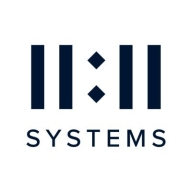

Find out in this report how the two Cloud Backup solutions compare in terms of features, pricing, service and support, easy of deployment, and ROI.
| Product | Market Share (%) |
|---|---|
| Nasuni | 1.1% |
| 11:11 Cloud Backup | 0.3% |
| Other | 98.6% |

| Company Size | Count |
|---|---|
| Small Business | 3 |
| Midsize Enterprise | 8 |
| Large Enterprise | 24 |
11:11 Cloud Backup is designed for businesses needing reliable data protection and secure storage. It offers scalable and efficient cloud backup solutions, tailored to meet diverse business needs.
11:11 Cloud Backup ensures data protection with a robust and flexible system. It stands out with its capability to handle large-scale data operations effectively, providing peace of mind for data security. Users benefit from easy data restoration, ensuring minimal downtime during data loss scenarios. The intuitive management interface promotes efficient data oversight, enhancing the data backup experience. As user demands grow, 11:11 Cloud Backup allows scalable upgrades for enduring data requirements. Users can improve their backup routines with strong encryption methods, safeguarding data integrity.
What are the essential features of 11:11 Cloud Backup?11:11 Cloud Backup implementation varies across industries, offering tailored data protection solutions. In finance sectors, it supports compliance through secure data retention. Healthcare organizations benefit from rapid data access and recovery. Retail businesses rely on its robust encryption to protect customer information.
Nasuni is a file data services enterprise focused on assisting firms with their digital transformation, global expansion, and information awareness. The Nasuni File Data Platform is a suite of cloud-based services designed to enhance user productivity, ensure business continuity, provide data intelligence, offer cloud options, and simplify global infrastructure. This platform and its auxiliary services are projected to replace conventional file infrastructure such as network attached storage (NAS), backup, and Disaster Recovery (DR), with an expandable cloud-scale solution. By storing file data in scalable cloud object storage from multiple providers, Nasuni positions itself as a cloud-native alternative for traditional NAS and file server infrastructure. Based in Boston, Massachusetts, USA, Nasuni serves sectors like manufacturing, construction, technology, oil and gas, financial services, and public sector worldwide, offering its services in more than 70 countries.
James J., IT Manager at a marketing services firm, says Nasuni’s management dashboard is helpful because he's able to view all of the different filers at once rather than check each one of them individually. He values the software’s security, reliability, good performance, helpful alerting, and responsive support.
According to a Server Engineering Services Lead at a mining and metals company, Nasuni offers good OR and DR capabilities, performs well, offers data security, and continuous file versioning helps recover from hardware failures.
The Managing Director of IT at a construction company appreciates Nasuni because it eliminates a lot of work that was previously done when managing backing up and restoring data files.
We monitor all Cloud Backup reviews to prevent fraudulent reviews and keep review quality high. We do not post reviews by company employees or direct competitors. We validate each review for authenticity via cross-reference with LinkedIn, and personal follow-up with the reviewer when necessary.